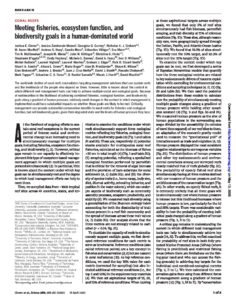Meeting fisheries, ecosystem function, and biodiversity goals in a human-dominated world

Author:
Joshua E. Cinner, Jessica Zamborain-Mason, Georgina G. Gurney, Nicholas A. J. Graham, M. Aaron MacNeil, Andrew S. Hoey, Camilo Mora, Sébastien Villéger, Eva Maire, Tim R. McClanahan, Joseph M. Maina, John N. Kittinger, Christina C. Hicks, Stephanie D’agata, Cindy Huchery, Michele L. Barnes, David A. Feary, Ivor D. Williams, Michel Kulbicki, Laurent Vigliola, Laurent Wantiez, Graham J. Edgar, Rick D. Stuart-Smith, Stuart A. Sandin, Alison L. Green, Maria Beger, Alan M. Friedlander, Shaun K. Wilson, Eran Brokovich, Andrew J. Brooks, Juan J. Cruz-Motta, David J. Booth, Pascale Chabanet, Mark Tupper, Sebastian C. A. Ferse, U. Rashid Sumaila, Marah J. Hardt, and David Mouillot
Publication Year:
2020
Citation:
Cinner, Joshua E., Jessica Zamborain-Mason, Georgina G. Gurney, Nicholas A. J. Graham, M. Aaron MacNeil, Andrew S. Hoey, Camilo Mora, et al. “Meeting Fisheries, Ecosystem Function, and Biodiversity Goals in a Human-Dominated World.” Science 368, no. 6488 (April 17, 2020): 307–11. https://doi.org/10.1126/science.aax9412.
Description:
The worldwide decline of coral reefs necessitates targeting management solutions that can sustain reefs and the livelihoods of the people who depend on them. However, little is known about the context in which different reef management tools can help to achieve multiple social and ecological goals. Because of nonlinearities in the likelihood of achieving combined fisheries, ecological function, and biodiversity goals along a gradient of human pressure, relatively small changes in the context in which management is implemented could have substantial impacts on whether these goals are likely to be met. Critically, management can provide substantial conservation benefits to most reefs for fisheries and ecological function, but not biodiversity goals, given their degraded state and the levels of human pressure they face.
See related content:
- Explore the site by related topics: Habitat and Biodiversity Loss, Marine Fisheries
